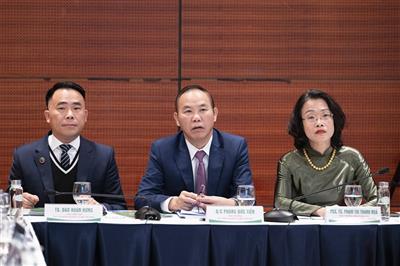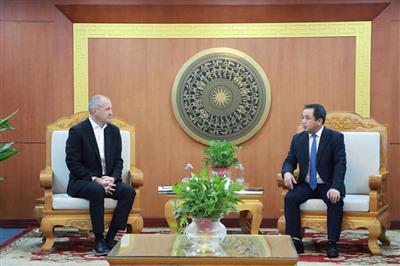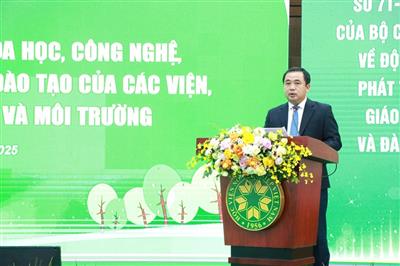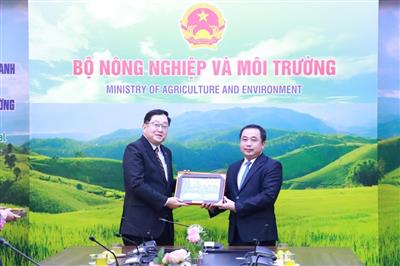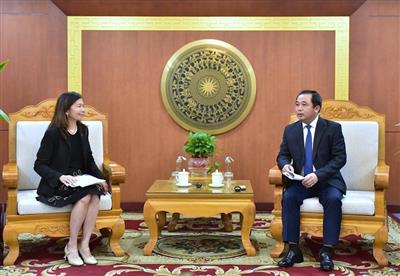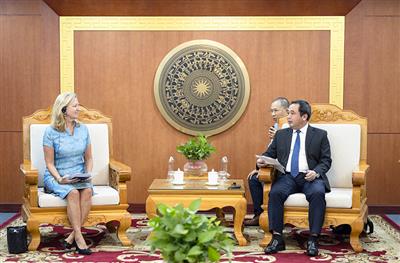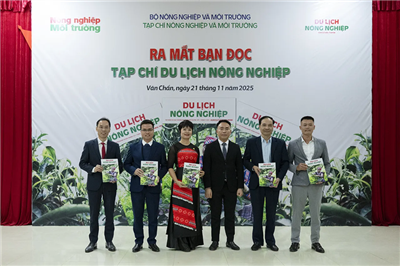
Deputy prime minster Tran Hong Ha: Sustainable development must be environmentally focused
01/10/2023TN&MTThis was the guidance provided by Deputy Prime Minister Tran Hong Ha at the VCSF 2023 Forum on August 23, with the theme "Global Green Race: From Strategy to Sustainable Business Practices."
The Deputy Prime Minister emphasized that sustainable development must be comprehensive, encompassing three pillars: Sustainable Economic Development, Sustainable Social Development, Culture, and Human Development, and Sustainable Environmental Development. "All enterprises, regardless of scale or sector, have opportunities, positions, potential, and promises to contribute significantly to the current global green race for sustainable development," he stated.
The Deputy Prime Minister also shared that the government will continue to direct the synchronized implementation of measures to promote sustainable development across all sectors. Positive actions and policies related to the environment will be integrated into strategies, plans, and investment policies within each economic and social field.

Deputy Prime Minister Tran Hong Ha delivered directive remarks at the forum
Before this, a representative from the World Bank (WB) analyzed that Vietnam aspires to become a high-income economy by 2045, with an average GDP growth rate of 5.5% per year and average income increasing by 3.5 times compared to the present.
To achieve the desired income growth, Vietnam is actively undergoing a significant structural transformation. The proportion of agriculture in GDP has decreased from over 40% in the late 1980s to under 20% in recent years. The service sector accounted for 41.3% in 2022. Over 40 million people have escaped poverty from 1990 to 2014. The extreme poverty rate (USD 1.9 per day) has decreased from 50% in 1993 to under 3% today.
However, alongside economic growth, Vietnam has witnessed the fastest growth in energy consumption and emissions. Over the past two decades, Vietnam has been one of the countries with the fastest growth in greenhouse gas (GHG) emissions per capita in the world.
"From 2000 to 2015, CO2 emissions increased nearly fourfold, Vietnam's GHG emissions are linked to hazardous air pollution, affecting health and labor productivity. The energy sector is the largest source of GHG emissions in Vietnam, followed by industry and transportation," the WB observed.
Ms. Pham Minh Thao, Director of WWF-Vietnam's Sustainable Development Program, also stated that the environmental challenges in Vietnam are increasingly severe and require timely solutions. Abnormal climate events are occurring in many cities, especially mountainous areas like Tay Nguyen and the Northwest, which were considered never to experience such events but have recently faced frequent occurrences, posing significant risks to human life.
To enhance resilience to extreme events, Ms.Thao suggests that Vietnam needs to build capacity for emergency response, develop the industry, and establish risk management mechanisms to ensure sustainable risk management for the future.
"Firstly, it is essential to minimize emissions into the environment, reduce deforestation, eliminate waste incineration, and discharge solid waste and plastic waste into the environment. At the same time, we must strengthen recycling solutions linked to green production," she noted.
Mr. Nguyen Quang Vinh, Deputy Chairman of VCCI, also presented his perspective: Business models that prioritize nature – businesses that positively impact the environment – are one of the most optimal solutions for the sustainable development of enterprises, thereby contributing to the common prosperity of the nation.
Facing the requirements of sustainable development, the business community needs to redefine the success of businesses, which is not just about financial figures but also includes the ability to adapt, withstand, and recover from unprecedented challenges. "Businesses need to align their long-term success with the sustainable benefits of the community, society, and the environment," Mr.Vinh concluded.
PV


